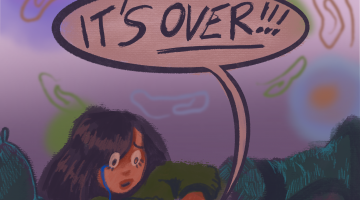
Breanna Denney/Nevada Sagebrush Chenay Arberry addresses a crowd of protesters gathered on the steps of the Mathewson-IGT Knowledge Center on Tuesday, Dec. 9, 2014. The protest, called the “Die-in,” was organized by the Reno Justice Coalition to show solidarity with the Black Lives Matter movement.
By Amy Serrano
On Aug. 26, a banner was posted outside of the Unitarian Universalist Church of Northern Nevada with the phrase “Black Lives Matter.” A day after the sign was put up, the banner had been defaced with the word “white” spray-painted over the word “black.”
With this church being not even 10 miles from campus and with the Black Lives Matter movement having been around for more than two years, this act of vandalism and what it says about where we are as a community and as a country is beyond terrifying.
When I first decided that I wanted to write about this, I was advised to tread lightly due to the recent attacks on police officers throughout the country. I realize that when discussing Black Lives Matter, it’s not only impossible, but also reckless to skip around the tension between the black community and the police force. Ignoring that tension displays an ignorance that is partly to blame for this country’s seeming incapability of moving forward in this matter.
Knowing how I regard police is important in understanding why I feel the way I do about Black Lives Matter. I was born and raised in Chicago with a state trooper for a dad. Through my dad and his friends, I have been exposed to police officers at their best. Through my environment, I have been exposed to police officers at their worst.
I first learned what a power trip looked like when I saw former Chicago Police Commander Jon Burge’s face on the news when he was convicted of running a torture ring that involved over 100 black men. I was around 16 when I heard this, and after that it just seemed careless to disregard what was happening around me locally, nationally and internationally.
Through my upbringing, I’ve learned to respect the cops that follow their oath of service and protection, but have been nothing but disgusted by those who abuse their positions. I’m sure many people hold a similar position on the matter, just as I’m sure that there are people that feel differently.
This isn’t about who’s right and who’s wrong, though. This is about systematic racism that is occurring both locally and nationally and needs to be acknowledged and acted upon. Whether it’s through a national story about how cops are using unnecessary and excessive force or through a local story about someone who vandalized a sign at a church, a conversation needs to happen.
At this moment in time, I believe that the Black Lives Matter campaign is among one of the most necessary and effective movements in the fight for equality in the United States. It opens up a discussion that is long overdue about how the black community, as well as other minorities, are treated in America.one
I see a lot of people on social media arguing that the hashtag “all lives matter” should be the movement that leads America to racial equality. While the sentiment “all lives matter” is absolutely true, the fact of the matter is that no one said that all lives mattered until someone said that black lives mattered.
Using the “all lives matter” hashtag encourages people to disregard the human rights violations that are occurring throughout the country and draws attention away from one of the groups of people that this country has arguably traumatized the most.
Black Lives Matter is a movement that everyone who supports racial equality should back up. It doesn’t encourage black supremacy; Black Lives Matter encourages Black equality. Someone who tags the word “white” over the word “black” in a Black Lives Matter banner, on the other hand, either thinks the white race is superior or just has a serious misunderstanding of the problem.
Either way, something needs to change.
Amy Serrano studies journalism. She can be reached at alexandraschultz@unr.edu.










